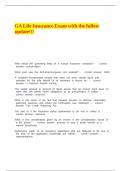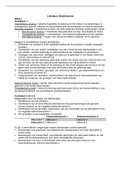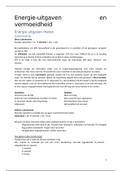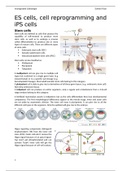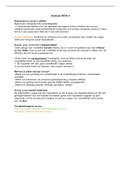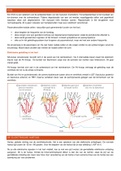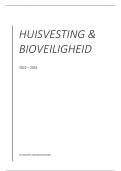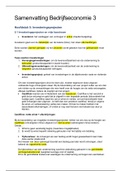1.1 The importance of science
A SAMPLE CASE: HUMAN CAUSED CLIMATE CHANGE
Global temperature increase of 2° would be devastating for Earth
1. Direct changes to Earth’s climate:
▪ Greenhouse gases trap heat in the atmosphere; increase of gases entails
increase in amount of trapped heat. The effects include: shrinking ice sheets,
rising sea levels, instability in precipitation patterns, shifts in flowering times
2. Downstream Effects
▪ Ecological: Extinction of animal & plant species, collapse of ecosystems, increase
in frequency of extreme weather
▪ Social: Increase in droughts/reduced access to drinking water, decrease of crop
yield, flooding of coastal cities/countries, migrant crisis
What’s special about current climate changes is the role of human activity in causing the changes
Keeling curve: a graph plotting ongoing change in concentration of CO2 in the Earth’s atmosphere
Understanding how scientists acquire new knowledge, the basis for science’s authority as a source of
knowledge, and the limits of that authority gives us greater reason to trust scientific knowledge. We
have already articulated the reasoning leading to the conclusion that human activities are radically
altering Earth’s climate. But how do scientists really know?
- First, it’s important to consider the nature of expertise. The types of expertise required for
these positions takes years, even decades, to develop.
- It is the result of an agreement within the community of relevant experts. A recent meta-
survey shows that 99.7% of climate scientists accept anthropogenic climate change
o This agreement is grounded in a rich body of independent sources of evidence,
which all support the same conclusion:
▪ Theories in physics explain how heat radiation works
▪ Physical chemistry explains how atmospheric CO2 traps heat
▪ Various technology allows scientists to collect information about e.g.
average global temperatures, sea levels, and ice levels
▪ Models & simulations allow scientists to make testable predictions –
predictions which later evidence has confirmed
Yet, despite decisive scientific evidence, public awareness and concern for climate change lag behind
the research. This mainly depends on understanding its human causes and on one’s level of
education.
1
,Illusion of understanding: a lack of genuine understanding about some topic is linked to a lack of
appreciation for the depth of one’s ignorance about that topic. Applied to climate change, this
means that people who have no advanced education or training in science, tend to have
unwarranted confidence in their ability to assess scientific findings or make pronouncements about
climate change.
- Finding information through internet searches (so-called Google knowing) has diminished
genuine understanding.
Understanding
i. how scientists acquire new knowledge,
ii. the basis for science’s authority as a source of knowledge, and
iii. the limits of that authority
is vitally important for helping us best decide what to believe, who to believe, and how to learn
more
What is Science good for? Why is it important?
Practical benefits:
• Medical
• Technological
• Engineering
Science is the best approach for answering questions about the natural world & for developing
innovations off of that knowledge.
Science aims at the production of knowledge. indirect consequence: The production of some things
Knowledge is an achievement – conditions must be met in order for one to possess it.
The standard philosophical account of knowledge treats it as having three conditions:
- Belief: you can’t know something without believing it is true
If you don’t believe it, it would be weird to know something.
- Justification: To know something, one must have good reasons to believe it is so.
if you can’t provide a reason for why you take it to be true, then you don’t know. So if you
randomly guess something it isn’t knowledge.
- Truth: Justified beliefs must also be true to count as knowledge.
if it isn’t the case then there is no way you know.
Each condition is necessary; they are jointly sufficient
Consider the knowledge that the Earth’s atmosphere is warming up. On the traditional
conception of knowledge as justified true belief, you have this knowledge just if (i) it’s true
that the Earth’s atmosphere is warming up; (ii) you believe that it is warming up; and (iii) you
are sufficiently justified in believing that it is warming up.
Necessary condition: must be satisfied in order for outcome
- Being in the Netherlands is necessary (but not sufficient) for being in Tilburg.
Sufficient condition: the satisfying entails the outcome
- Being in Tilburg is sufficient (but not necessary) for being in the Netherlands.
Science is especially good at providing justification. By engaging in science, we can discover evidence
that helps us explain why something that we believe is true i.e. Consider the data we appealed to
concerning climate change!
2
,Types of Knowledge:
- Pure Knowledge: knowledge for its own sake.
o Scientists have investigated the conditions under which rainbows form, not because
they think that learning about rainbows will generate technological inventions or
cure diseases, but simply because they are interested in optics.
→ Levels of CO2 in atmosphere
- Explanatory Knowledge: knowledge of how things work/why they are the way they are
→ Increasing atmospheric CO2 leads to more trapped heat
Explanatory knowledge is more useful, because we can leverage and do stuff with it.
Types of Research
- Basic Research: research aimed at pure knowledge
→ Measuring atmospheric CO2 levels
- Applied Research: research that uses knowledge to develop something (e.g. a product, drug)
→ Carbon-capture and storage (CCS)
These often work in synergy. The process of developing a product can lead to innovations in pure
knowledge, which can then be leveraged to support new applied research…
Scientists aim to gain knowledge about certain kinds of phenomena – appearances of things in the
world. In principle, the target of science includes everything.
But don’t confuse everything being a target of science with science being the appropriate tool to use
for every problem – there are limits to the scope of science
- Science does not replace other intellectual pursuits/activities, like literature or philosophy
o Basing our scientific knowledge about climate change on fluctuating political
agendas would be a mistake. But when it comes to addressing climate change with
policy interventions, debating which steps are politically feasible and desirable is fair
game for politicians
- Science is also restricted to natural, rather than supernatural, entities
3
, 1.2 Defining Science
First of all, why is a definition of ‘science’ important?
- Science has massive impact on society
- Science is credited with epistemic authority and legitimacy that other endeavours are not
- Scientists are taken to be experts (in their relevant fields)
- Science is one of the major elements of what we teach in schools
If something that isn’t genuinely science garners these benefits, then we likely face substantial risks,
both individually and as a society
What is science? We divide this question in two parts:
1. What’s distinctive and important about science when it comes to generating knowledge?
2. Where do we draw the line between science and non-science? (=Demarcation)
o The demarcation of science from non-science is especially important because some
non-scientific projects are designed to look enough like science to deceive people
into thinking that these projects too can lay claim to the authority and legitimacy of
science
o Pseudoscience: These deceptive attempts to appear scientific e.g.
▪ Homeopathy; a system of alternative medicine based on the idea that
substances that cause the symptoms of a disease can cure similar symptoms
in sick people when repeatedly administered in diluted water
▪ Conversion Therapy; psychological or spiritual intervention is used to try to
change a person’s sexual orientation
Meyers-Briggs Type Indicator (test to determine your character) is paradigmatic pseudoscience,
because;
- Fails to measure what it purports to measure
- No predictive power
- Poor reliability – gives different results for the same person on different occasions
- Categories measured are not independent (JP and SN scales correlate)
- Not comprehensive (e.g. ignores neuroticism)
Technical analysis – analysis “methodology” for forecasting direction of prices through study of past
market data (esp. price and volume) is also a pseudoscience, because;
- No real predicative power (it relies on the statement that the market never changes, but it
does)
- Extremely poor reliability – can apply same “analysis” tools to same market at different times
and get wildly different results
- Assumes markets are both not adaptive and non-random
o Past prices are extremely poor indicators of future prices!
- Mis-uses technical tools to see ‘illusory correlations’ (Bender et al 2013: 625-52)
A good Demarcation answer is broad enough to include all science, and narrow enough to exclude
pseudo- and non-science. But finding a good answer is hard, also because of the large variety;
- Physical sciences, like astronomy and inorganic chemistry
- Life sciences, like botany, evolutionary biology and neurobiology
- Social sciences, like anthropology, social psychology, and behavioral economics
Different fields often study different kinds of things, make different assumptions, use different
methods, and have different aims. Any feature used to define science may accidentally exclude not
just pseudoscience and nonscience but some scientific projects as well.
4


